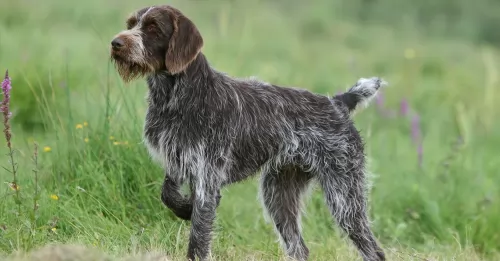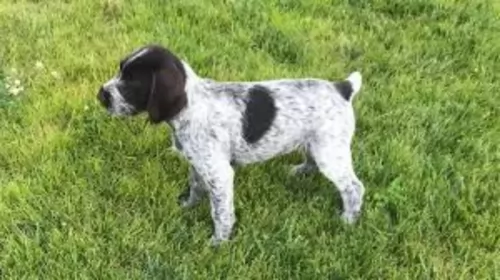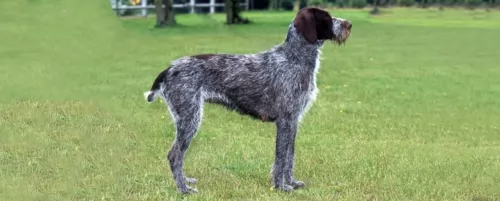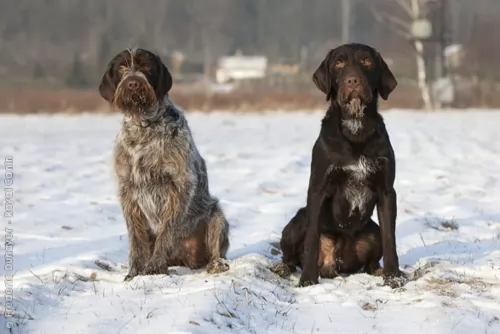 Petzlover
Petzlover Cesky Fousek is originated from Czech Republic but Welsh Corgi is originated from United Kingdom. Cesky Fousek may grow 36 cm / 15 inches higher than Welsh Corgi. Cesky Fousek may weigh 13 kg / 29 pounds more than Welsh Corgi. Both Cesky Fousek and Welsh Corgi has almost same life span. Both Cesky Fousek and Welsh Corgi has almost same litter size. Cesky Fousek requires Low Maintenance. But Welsh Corgi requires High Maintenance
Cesky Fousek is originated from Czech Republic but Welsh Corgi is originated from United Kingdom. Cesky Fousek may grow 36 cm / 15 inches higher than Welsh Corgi. Cesky Fousek may weigh 13 kg / 29 pounds more than Welsh Corgi. Both Cesky Fousek and Welsh Corgi has almost same life span. Both Cesky Fousek and Welsh Corgi has almost same litter size. Cesky Fousek requires Low Maintenance. But Welsh Corgi requires High Maintenance
 The Cesky Fousek is also known as the Bohemian Wire-Haired Pointing Griffon and he hails from the Czech Republic. The name ‘Fousek’ is referring to the dogs facial hair.
The Cesky Fousek is also known as the Bohemian Wire-Haired Pointing Griffon and he hails from the Czech Republic. The name ‘Fousek’ is referring to the dogs facial hair.
With World War 1, the dog all but disappeared, but with careful breeding, its numbers have built up. Today the dog is a popular hunting breed in its home country. In 1957 and 1958, Czechoslovakia joined the Federation Cynologique Internationale, and this is when a new breed standard was written and approved. In 1964, the dog breed was recognized by the FCI and by the United Kennel Club in 1996.
The Cesky Fousek has even been represented on postage stamps issued in the country in 1965, and again in 1973. Today, the breed is as popular as ever in the Czech Republic as well as other countries where there are breeding programs.
 The Pembroke Welsh Corgi and the Cardigan Welsh Corgi were once considered to be two types of the same breed. Today they are recognized as very different breeds, but cousins of sorts.. They are alike in many ways and very different in others. The general information in terms of height and weight above applies to the more popular and better known Pembroke Welsh Corgi, developed as a herding dog from the spitz line in Pembroke shire, Wales. The Pembroke is famous for being the breed favored since childhood by Queen Elizabeth, the current queen of England. It’s believed that the Pembroke came to the country around the 10th century with Flemish weavers. The Cardigan is thought to have come with the Norse people and be a relative of the Sedish Vallhund.
The Pembroke Welsh Corgi and the Cardigan Welsh Corgi were once considered to be two types of the same breed. Today they are recognized as very different breeds, but cousins of sorts.. They are alike in many ways and very different in others. The general information in terms of height and weight above applies to the more popular and better known Pembroke Welsh Corgi, developed as a herding dog from the spitz line in Pembroke shire, Wales. The Pembroke is famous for being the breed favored since childhood by Queen Elizabeth, the current queen of England. It’s believed that the Pembroke came to the country around the 10th century with Flemish weavers. The Cardigan is thought to have come with the Norse people and be a relative of the Sedish Vallhund.
The Cardigan Welsh Corgi, also a herding dog has their ancestry in ancient Celtic dogs. They are older than the Pembroke and hail from Cardiganshire, Wales.
Both breeds are friendly, smart and independent. Both dogs herd cattle and sheep. About the end of the 19th century, farmers in Cardiganshire began to raising sheep rather than cattle. The corgis were herding dogs for cattle. “Heelers” who avoid the cattle kicking them by nipping at the cattle’s heel. Pembrokeshore and Cardiganshire are counties in South West Wales that adjoin each other.
Then the move was made from cattle to sheep in Cardiganshire they bred their corgis with the Welsh Sheepdog where the merle color is said to come from, and the Pembroke Welsh Corgi. This caused the similarities between the two dwarf breeds. At the same time the distance grew between the two breeds and they grew into very distinct and different looking dogs. There are also some differences in their personalities.
The first corgi to appear at Crufts came in 1927 and in 1928 a Pembroke won a championship at Cardiff for the first ever corgi win. It was not until 1934 that the kennel club recognized them as separate breeds rather than a Pembroke shire type and a Cardiganshire type. From this point on the two are separate breeds with tremendous similarities. A Pem won the Reserve Best in Show at Crufts in 1955.
The first corgi came to the United States in 1933 by a breeder of Old English Sheepdogs. In 1934 the American Kennel Club (AKC) recognized Corgis as one breed with 2 types. The Pembroke has always been the more popular of the two.
 The Cesky Fousek is a medium sized dog with both the male and the female standing between 58 – 66cm and weighing 22–28kg. The dog has a fairly distinctive appearance, looking quite a bit like a German Wire-haired Pointer, but he has the mustache and beard which the Pointer doesn’t have.
The Cesky Fousek is a medium sized dog with both the male and the female standing between 58 – 66cm and weighing 22–28kg. The dog has a fairly distinctive appearance, looking quite a bit like a German Wire-haired Pointer, but he has the mustache and beard which the Pointer doesn’t have.
The tail of this dog is carried horizontally and is generally docked to 3/5 of its natural length to give the dog a distinctive look. These days, with regulations around docking, the tail is left long. The ears are floppy and rounded at the tips and the eyes are brown.
The dog’s coat is short to medium length and fairly coarse with colors being dark roan or brown with ticked markings.
The Cesky Fousek is an energetic, eager-to-please dog and he just loves playing with the children in the home. He is an intelligent dog who is loyal, social and protective and you’ll find that he is easy to train. In fact, with socialization and training, he becomes obedient and amicable around adults, children and other pets.
 They used to differentiate between the Cardigan and the Pembroke by saying the Cardigan was the one with the bigger ears and the Pembroke had no tail. In many parts of the world where tail docking has been banned, most Pembrokes now have tails. Only those born without don’t have them. Both dogs are long and low to the ground with big chests and short legs. This is because they are dwarfs. They are not little dogs.
They used to differentiate between the Cardigan and the Pembroke by saying the Cardigan was the one with the bigger ears and the Pembroke had no tail. In many parts of the world where tail docking has been banned, most Pembrokes now have tails. Only those born without don’t have them. Both dogs are long and low to the ground with big chests and short legs. This is because they are dwarfs. They are not little dogs.
The Cardigan Welsh Corgi is heavier boned than the Pembroke, has large rounded ears and a flowing, fox like tail. The Cardigan comes in a variety of colors but never predominately white. He is double coated with a dense, harsh outer and a soft, short and thick undercoat.
Pembroke is smaller and longer than the Cardigan with pointed ears. They are intelligent, sturdy and strong with tremendous stamina. The tail is docked in the United States or the pups are bred not to have a tail. This was originally so that the cattle could not step on their tails and injure the dogs. The double coat on the Pembroke is short and weather resistant inner coat with a longer and rougher outercoat. He has the same deep dropped chest as the Cardigan. Both corgis shed voraciously.
 The Cesky Fousek is a fun loving, good natured dog who is always up for a game. This is why he isn’t a dog that will fit into an apartment or shoe-box size garden.
The Cesky Fousek is a fun loving, good natured dog who is always up for a game. This is why he isn’t a dog that will fit into an apartment or shoe-box size garden.
Socialize and train him and he becomes a wonderful family pet, good around children and other pets. He loves human companionship and isn’t a dog to be left outside to run around on his own.
The Cesky Fousek is easy to train, and when he is treated properly and made to feel an important member of the family, he provides you with his unconditional love and friendship.
 1Children friendliness For the most part they are good but can be grumpy and bossy. They are bossy personalities
1Children friendliness For the most part they are good but can be grumpy and bossy. They are bossy personalities
3.Adaptability – Very. Can live anywhere but they do need to run and they bark a lot.
4.Learning ability – incredibly smart but stubborn. Respond well to training that is reward based.
 The average lifespan of this dog breed is about 12 to 15 years, and even though he is a robust breed, some common health issues do exist.
The average lifespan of this dog breed is about 12 to 15 years, and even though he is a robust breed, some common health issues do exist.
Certainly if you’re considering breeding for your Cesky Fousek, you’ll want to have him tested for dysplasia, eye problems and Von Willebrands Disease.
Von Willebrands Disease is an inherited bleeding disorder, caused by a deficiency in the amount of a specific protein needed to help platelets.Often the dog doesn’t show outward evidence of having the disease while other dogs might even hemorrhage from the nose or elsewhere.
 • Degenerative Myelopathy – a muscular neurological disease very similar to Lou Gehrig’s Disease or ALS. It is always fatal.
• Degenerative Myelopathy – a muscular neurological disease very similar to Lou Gehrig’s Disease or ALS. It is always fatal.
• Some have cardiac issues while others may have hip dysplasia or Von Willebrand’s disease.
 The coat of the Cesky Fousek is easy to maintain and you’ll want to brush him at least twice a week with a firm bristle brush to get through the coarse hair and rid him of loose hairs.
The coat of the Cesky Fousek is easy to maintain and you’ll want to brush him at least twice a week with a firm bristle brush to get through the coarse hair and rid him of loose hairs.
Ear infections are common in dogs, but dogs with floppy ears are more susceptible to ear infections than dogs with erect ears. The infection often starts in the external ear canal and occurs when excess bacteria grows in the ear canal and it becomes inflamed.
Always take your pet to the veterinarian at the first sign of an ear infection. You’ll notice your pet shaking his head and the ear may well be red and inflamed. Your vet will discuss the proper treatment and suggest ways to prevent recurrence. The vet may also recommend an ear cleaning solution as well.
This dog breed needs plenty of exercise and he’ll love his daily walks with you. Put him on a leash and allow him to run with you when you go cycling or jogging.
This is a very active dog used to hunting and he’ll require good quality protein. Speak to your vet about how many calories your dog will need each day, more so if you have a puppy and are unsure in terms of his growth.
He is a medium-to-large breed so you’ll want a food that caters for his size, his age and his energy. Include portions of rice, vegetable and meat into his kibble from time to time for variety, and never forget to include some raw meat into his diet.
Fresh, cool water is of critical importance and should be available night and day.
 1Feeding the puppy prone to overweight, the pem needs ½ to 1 cup of small breed high quality food in 3-4 meals per day. The Cardigan needs ¾ to 1 ¼ cups of high quality small breed food in 3-4 meals per day.
1Feeding the puppy prone to overweight, the pem needs ½ to 1 cup of small breed high quality food in 3-4 meals per day. The Cardigan needs ¾ to 1 ¼ cups of high quality small breed food in 3-4 meals per day.
2.Feeding the adult – Don’t overfeed them. The Pem need 1 cup per day of high quality small breed food in 2 meals per day. The Cardigan needs 1-1 ½ cups per day in one to two meals.
They are fast, athletic dogs. Agility, CAT, Barnhunt. Herding trials, flyball and they just love backyard ball fetching. Confirmation and obedience, along with rally.